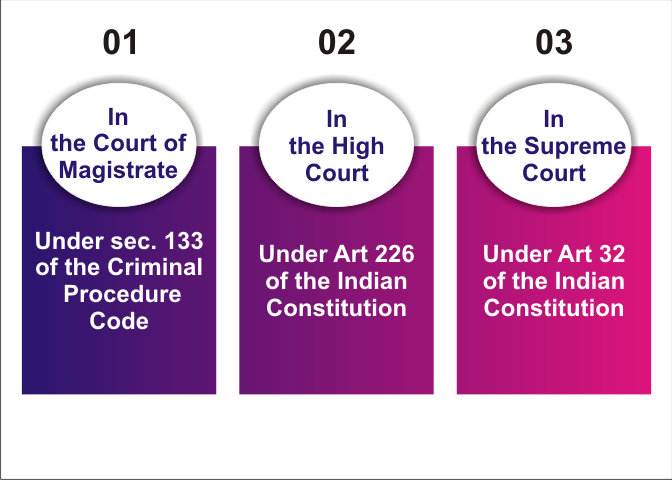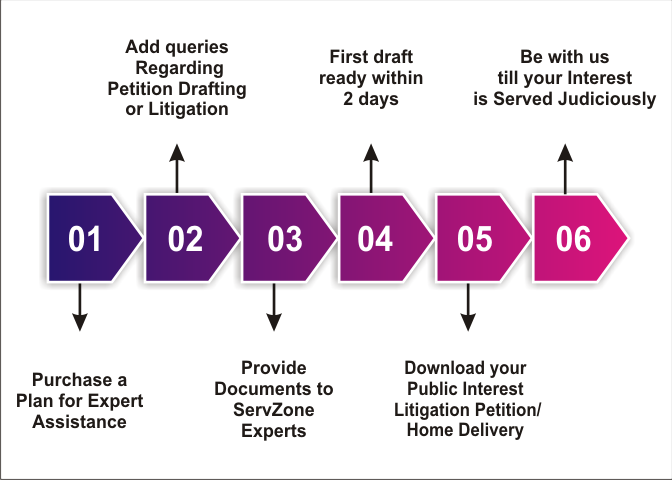Get Started With
servzone
Overview
Public interest litigation is for public interest litigation, which means litigation for the protection of public interest. This is an essential concept in politics and law, which is also evident in television, particularly in news. Public Interest Litigation (PIL) is a technique or a practice that emphasizes the citizens of any country. It is offered in a court of law by a private party or by the court itself, and not by the agitated party.
The objectives of PIL are given below: -
- The Public Interest Litigation has become a powerful tool to enforce the legal obligation of the legislature and the executive.
- The main motive behind the PIL is to ensure the welfare of the common people of the country.
- It is not generally used to protect individual interests, but to protect group interests - for which fundamental rights have been granted.
- The High Courts and Supreme Court of India has the right to issue Public Interest Litigation.
- The perception of Public Interest Litigation stems from the supremacy of "judicial review."
- The concept of Public Interest Litigation has diluted the principle of 'locus standi.''Locus Standi' indicates that only 'persons / party' whose rights have been violated can file a petition before the competent court.
- Public interest litigation is generally used to challenge the decisions of public officials by the prescribed standards of judicial review, in order to review a failure in action, or by a public body, or the validity of a decision or action. Could.
- The Public Interest Litigation has played an essential role in India's polity and legal fraternity. He has been responsible for some historical decisions in India. They have opened the doors to Sabarimala, immediately banned triple talaq, legitimately legalized homosexual relationships and provided Haji Ali women with passive, euthanasia and many other legal legalities.
Who can file a PIL?
Public interest litigation can be filed by an Indian citizen in a court of law. However, the only condition is that it should be recorded in the public interest rather than entertained by any private interest. Many times the court considers a case of very public importance, then it also takes automatic cognizance. In those cases, the court appoints a lawyer to handle such critical situations.
What is the importance of PIL in India?
The very basic objective of the PIL is to make justice available to the 'poor', and 'marginalized' sections of Indian society.
The main importance is given below: -
- It is a valuable tool for human rights to those who have been denied rights and also violated.
- It democratizes the entry of justice for all the people of the country. Any agency or citizen can file a petition on behalf of those who do not have the means to do so.
- It helps in judicial monitoring institutions like protective homes, asylums, prisons etc.
- Public interest litigation is an essential tool to encourage social development and balance between 'law and justice' and to maintain 'rules of law'.
Under what conditions can a PIL be filed?
- Violation of fundamental rights or moral rights.
- Violation of human / moral rights of poor and marginalized sections of society.
- Force municipal authorities to remove public charges.
- Execution of Central / State Government policy.
Procedure to File
The Public Interest Litigation can be filed in the Supreme Court of India or High Court, depending on the situation. Both the courts have the power to decide the Public Interest Litigation under different Provisions of the Indian Constitution.

The Supreme Court
If the Public Interest Litigation is filed in Supreme Court, then five sets of the petition must be filed opposite the party served, the copy only if the notice is delivered. The court can take action and treat a letter as a writ petition also. The court has to contend that the writ petition complies with the following aspects.
Those are as follows:-
- The letter is addressed by a public-spirited individual or a social action group or by the aggrieved person.
- They should work to enforce legal or constitutional rights to any person who cannot approach the court for redress upon disability or poverty.
- If the court gets satisfied, the court can also take action based on newspaper reports in such cases.
In High Court
The person is required to file two copies of the petition if a Public Interest Litigation is presented in a High Court. By the same token of the response, an advance copy of the petition must send to the opposite party (respondent). It will act as a proof of service which has to be attached to the petition.
Step-by-step Procedure
Depending on the situation, the PIL can be filed in the Supreme Court of India or the High Court. Both courts are empowered to decide public interest litigation under various provisions of the Indian Constitution.
- Step 1:
One has to do complete research about this issue before filing a PIL. Whenever a PIL is filed on a large scale concerning the people, the petitioner needs to consult all the individuals and groups affected.
- Step 2:
Later, once you are sure about filing a PIL to support your case by gathering all important documents and information as evidence. You can appoint a lawyer to argue on your behalf or to debate the case on your own.
- Step 3:
Before filing a PIL, it is always advisable to consult a lawyer. Also, be prepared to explain to the court and explain the problem if you are interested in arguing the case on your own in the allotted time.
- Step 4:
The Supreme Court format names the name of the defendant and the name of the petitioner. Format the & lsquo; Chief Justice & rsquo; Should be written and addressed. Of India. Additionally, you should proceed with the subject of the format to fill the required event.
- Step 5:
Once a copy of the PIL is ready to be filed in the High Court, and then present two copies of the petition in the court. Simultaneously a copy of the petition has to be given to the respondents in advance. This proof of furnishing a copy of the petition to the respondents is pasted into the petition.
- Step 6:
If a PIL is filed in the Supreme Court under Article 32 of the Constitution of India, then about five copies of the petition need to be presented in the court. When the court issues notice in respect of the same, the opposite party (response) is served with a copy of the petition.
Required Documents
- At the very 1st, you must Request a public interest lawyer or association to file your Public Interest petition.
- You must collect essential documents which are as follows:-
1. Identity proof,
2. Resettlement policy if any,
3. Title deeds,
4. Notice,
5. Verification of residence,
6. And photos of the eviction.
- Complete List names and addresses of all people approaching the court to file Public Interest Litigation.
- Full List of names and addresses of government officers from which relief is questioned.
- Complete List of events providing rise to violations of the fundamental rights of the concerned people.
- In the same way, collect all the dates when the eviction took place, when and if an eviction notice was provided, indicating the duration of stay at the site, and other significant details associated with the expulsion.
- You should also mention the relief being that has been sought from the court.
Servzone Procedure
A PIL is an important judicial review that will be prepared with careful consideration. Plenty of time should be allowed for drafting and all stages of negotiation. It is advised that a lawyer with significant 'public interest litigation experience' should be appointed to overcome the many potential pitfalls within the public interest litigation.
Servzone advises you to contact a consultant / lawyer to understand the requirement in detail. Initial information will be mandatory from your end to start the process. After providing all the information, the lawyers will start working on your document and payment will be received. In addition, you will receive the first draft of your petition within a few business days. You can evaluate the document, and intimate it for correction in case of any amendment.
Why servezone?
Servzone is one of those platforms that coordinates to meet all your legal requirements and continuously connects you with professionals. Yes, our clients are pleased with our legal service! Due to our focus on simplifying legal requirements, they have consistently treated us very well and provide regular updates.

Our clients can track progress on our platform at all times. If you have any questions about the PIL regarding the process of filing a petition, our experienced legal advisors are just a phone call away. The servzone will ensure that your communication with professionals is engaging and seamless.
Important Facts
Public interest litigation has a wide scope promoting the right to quality. Detailed view of wide range is given below: -
- The Public Interest Litigation creates a new regime of human rights by enhancing the meaning of fundamental right to life, equality, personal liberty, and many more. In this method, the right to dignity, free legal aid, a speedy trial, education, and human rights appears.
- This can be done by creating new types of relief in the context of the jurisdiction of the court. For example, the court may grant 'interim compensation' to victims of constitutional disorder.
- This can be done by judicial supervision of state institutions like women's protective homes, prisons and many more. The court pursues gradual reforms through judicial encroachments in its administration and management. The court handles the administration of institutions to protect human rights, depicted as creeping jurisdictions.
- From time to time, public interest litigation has taken the guidance of the Central Bureau of Investigation or the National Human Rights Commission or authorities as a violation of 'human rights', also known as 'investigative litigation'..’'
Fees
Compared to other court cases, public interest litigation seems inexpensive. Each defendant declared in the PIL will have to pay a fee of Rs 50, which should also be mentioned in the petition. However, the cost depends entirely on the lawyer in the entire proceedings which the petitioner has approved to argue on his own behalf.
What is the agenda on which a PIL cannot be filed?
The Supreme Court of India has given a detailed list of guidelines relating to filing public interest litigation, in which a public interest petition cannot be filed. Those cases are mentioned below: -
- Matters related to Landlord-Tenant
- Matters related to services
- Gratuity and pension related matters
- Grievances against Government Departments and Local Bodies, Central Government and State Government eliminates issues from items 1 to 10 declared in the list of guidelines
- Matters related to admission to educational institutions and medical institutions
- Petition for speedy hearing of pending cases in subordinate courts or High Court
How long does it take to hear a PIL case?
The court ends the hearing in a very short period of time and settles the case if it relates to the lives of many people or violates human rights. However, in general, it takes years of hearing and disposal of cases due to excessive public interest litigation in the courts.
However, the court may direct the officers to do some work during the hearing. After the final hearing by both parties, a final decision is rendered in matters relating to public interest petitions.


GST Registration

PVT. LTD. Company

Loan

Insurance


